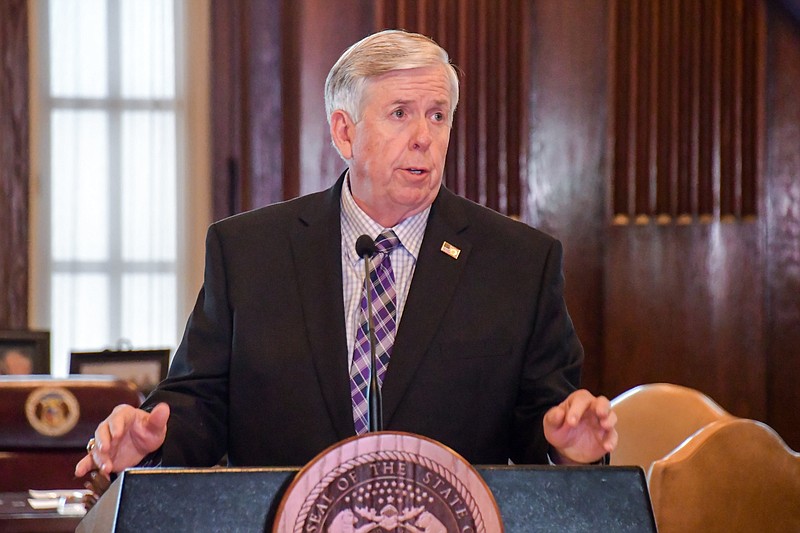Gov. Mike Parson told Missourians on Wednesday that news could be expected later today about the state's public health order currently set to expire at the end of the weekend.
The public health order guiding the first phase of eased restrictions on businesses and other activities is set to expire at 11:59 p.m. Sunday.
While businesses have been reopening since May 4 amid the COVID-19 pandemic, the order keeps in place the requirement for businesses and individuals to practice social distancing, limits the number of people allowed inside a retail establishment, requires restaurants to keep diners spread apart and limit the number of people at a table, and prohibits visitors from entering long-term care facilities, retirement homes or assisted living homes - unless to provide critical assistance or in end-of-life circumstances.
"We are pleased with how well things have gone so far, and we are still hopeful for the future. However, we must continue to be diligent and proactive in our efforts," Parson said.
"As long as we continue to be smart and protect ourselves and those around us, we will continue the progress we have made," he added.
Parson will announce more details at his 3 p.m. briefing today, which is livestreamed on Facebook at facebook.com/GovMikeParson.
In the meantime, the state continues to expand testing for COVID-19.
Ryon Richmond, interim executive director of the Missouri Veterans Commission, said Wednesday that all staff and residents of the state's seven veterans homes would be tested - that's 1,238 veterans.
Testing began Tuesday in St. Louis, was scheduled for Cameron on Wednesday, and there were plans in place for testing in Mexico and Cape Girardeau, Richmond said.
The remaining homes are in Mt. Vernon, St. James and Warrensburg.
Demand on Tuesday for community sampling - offering testing in a region to determine the prevalence of COVID-19 there - was a little more than what the goal had been. Parson said the goal had been to do 1,100 tests, and 1,273 were done.
Tests through community sampling are available for free to any Missouri resident - not just of the county where community sampling is taking place - and are also open to people not showing symptoms of COVID-19.
Registration for the community testing event in Boone County next week - June 1-2 at Hickman High School in Columbia - is available at health.mo.gov/communitytest.
The tests are done by nasopharyngeal swab and determine if a person has an active infection of the novel coronavirus that causes COVID-19.
Dr. Randall Williams, director of the Missouri Department of Health and Senior Services, said Wednesday that a third testing method is being developed - antigen testing.
The other testing methods are PCR testing - that's the swabbing of the nose, throat and other areas of the respiratory tract of the kind that's being done in the community sampling - and antibody, or serology testing. Antibody tests aim to determine if a person has already been infected with COVID-19 and has had an immune response that might protect them going forward.
Williams said antigen tests - which tell if virus particles are present in a person's nose - are not as accurate as PCR testing but take less time to get results and are inexpensive.
While the state is awaiting more guidance on the tests from the federal government, he added, "we think there are going to be lots of them done."
Williams said results of the three tests would not be aggregated together.
The state had been adding together results of PCR and antibody testing, as requested by the Centers for Disease Control and Prevention, but announced over the weekend those numbers would be separated in its public data dashboard on COVID-19, available at health.mo.gov/dashboard.
Williams said this week he had not been aware of the CDC's request when he said last week that the state was not combining the numbers, as other states had been doing.
Combining the numbers makes it difficult to truly understand a state's capacity for testing and can drive down the apparent positivity rate of tests for COVID-19.
When asked if he would approach conversations with the CDC differently going forward, Williams said: "I try to be gracious; these are my colleagues. I think that everybody is learning. It's a novel virus. It's different than anything really we've ever seen. I think that one has to understand we try to get better every day, we will learn more every day, to be humble in what you say because it can change in a week."

